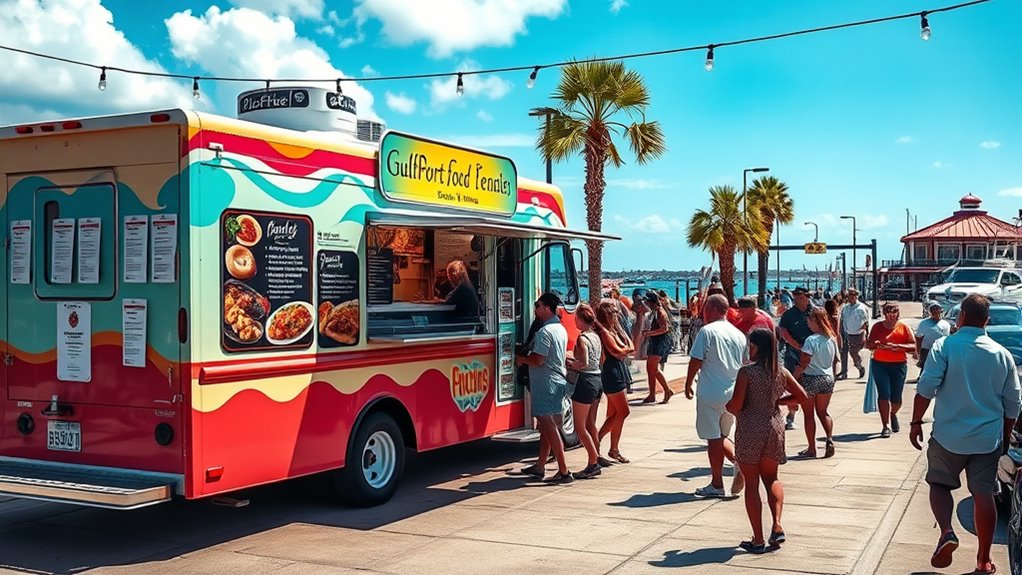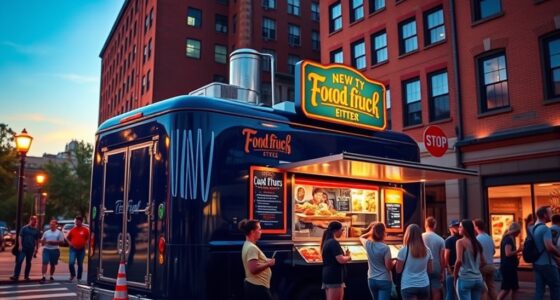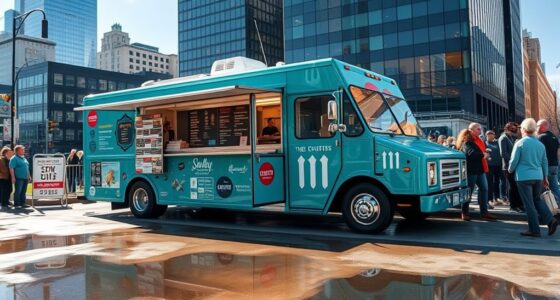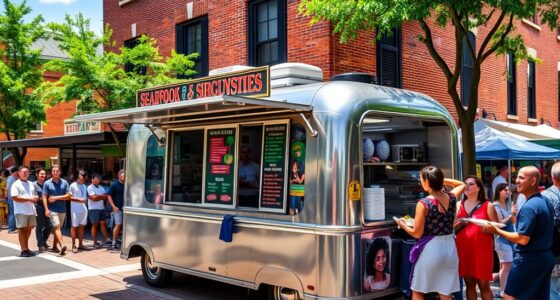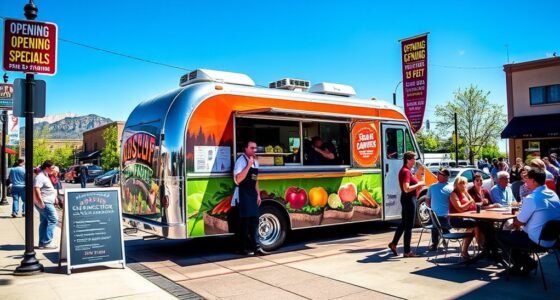To open a food truck in Gulfport, Mississippi, you’ll need permits from the Mississippi Department of Health and local agencies, costing around $200 to $600. Budget approximately $30,000 to $90,000 for your vehicle and equipment, plus ongoing costs for permits, insurance, and supplies. Choose high-traffic spots like downtown or events to maximize sales, and develop a compliant, appealing menu with strong marketing efforts on social media. If you’re enthusiastic to navigate the details, more tips are right ahead.
Key Takeaways
- Obtain necessary permits from Mississippi Department of Health, Department of Revenue, and local authorities, including mobile food, business licenses, and event permits.
- Budget for startup costs like vehicle ($30,000–$90,000), equipment, permits ($1,500–$7,000), and ongoing expenses such as permits, insurance, and utilities.
- Choose high-traffic locations like downtown, beaches, and event venues, ensuring compliance with zoning, parking, and health regulations.
- Design a menu focused on safe, prepared foods with clear allergen labeling, and follow strict food safety practices for sanitation and storage.
- Promote your truck through social media, participate in local festivals, build community ties, and leverage reviews and analytics to attract customers.
Navigating Permit Requirements and Regulatory Compliance
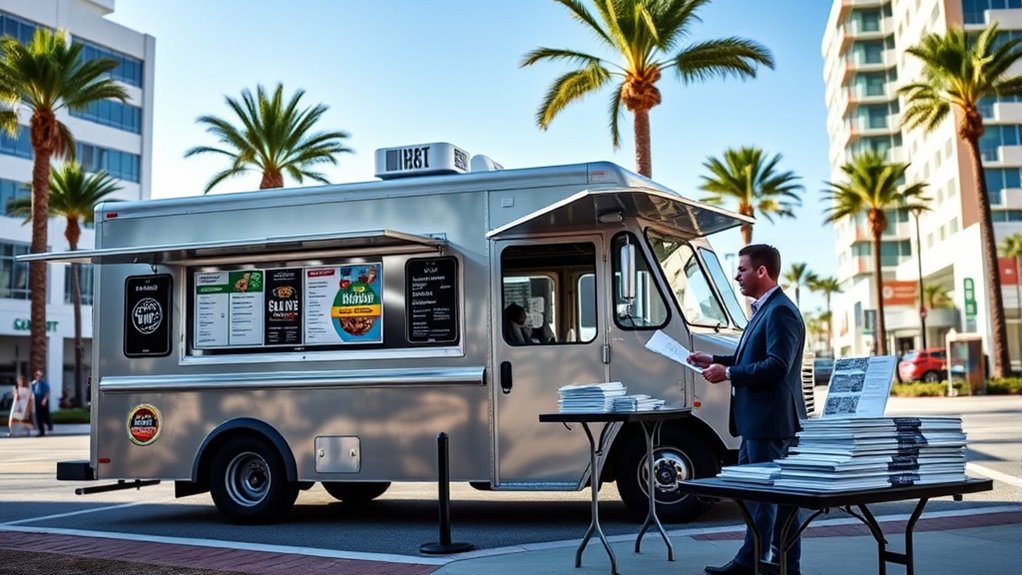
Managing permit requirements and regulatory compliance is essential for operating a food truck legally in Gulfport, Mississippi. You need to submit your mobile food vending permit application at least 20 days before you plan to start. Permit fees in the area are roughly $250 per vehicle for 90 days, with an additional $25 for renewals. When applying, you must provide a detailed site plan, including photos, truck orientation, and service layout, along with proof of lease or property owner consent for each location. An indemnity agreement holding the city harmless is also required. Additionally, you must obtain a food vending permit from the Mississippi Department of Health, comply with food safety regulations, and pass inspections. Ongoing Responsibilities: Permits and licenses may require renewal or periodic updates to remain valid. Keeping documentation, such as permits, insurance, and notices, up to date helps you stay compliant and avoid penalties.
Estimating Expenses for Your Food Truck Venture
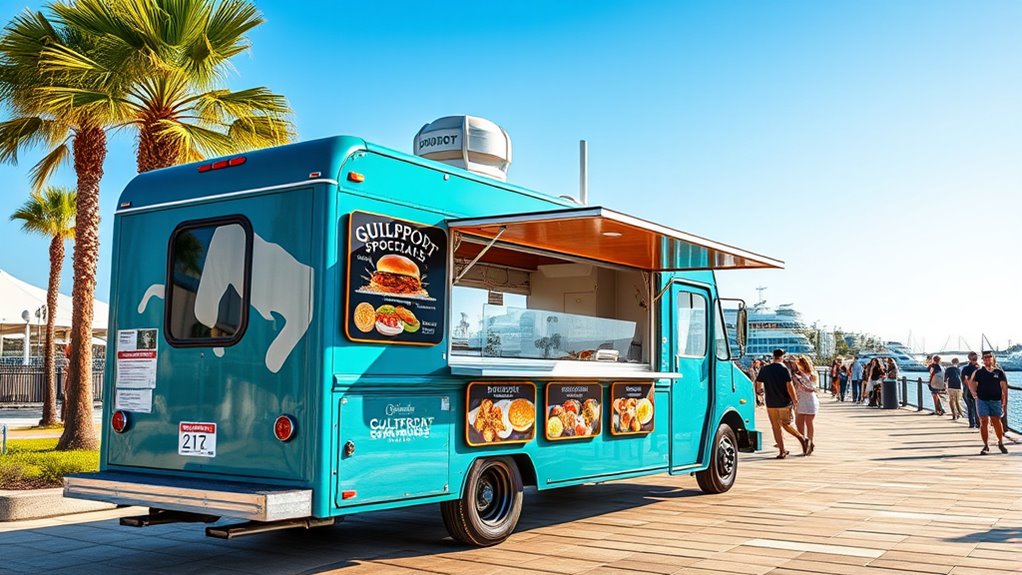
To begin your food truck journey, you’ll need to carefully estimate your startup costs, including vehicle purchase or rental and equipment. You also need to plan for ongoing expenses like permits, licenses, and regular operating costs. Understanding these financial factors helps you set a realistic budget and assure your venture stays profitable. Accurately estimating these costs from the start can help prevent cash flow issues and allow for better financial planning. Additionally, researching Grocery Savings Strategies can help you manage expenses more effectively as your business grows.
Startup Costs Breakdown
Starting a food truck in Gulfport requires careful budgeting to cover essential expenses. Vehicle costs vary from $30,000 to $90,000, depending on whether you buy new or used, or opt for a custom-built trailer. Kitchen equipment—like grills, refrigerators, and fryers—adds another $10,000 to $50,000. Renting a truck can reduce upfront costs, while equipment upgrades for health and safety compliance may require extra investment. Permits and licenses typically range from $1,500 to $7,000, with additional fees for event permits and commissary rentals costing $300 to $800 monthly. Don’t forget insurance, safety equipment, and branding costs such as truck wraps, which can add thousands. Budget for all these essentials to guarantee your Gulfport food truck startup gets off to a strong start. Additionally, understanding the home improvement process can help you create an efficient and well-organized setup for your mobile business.
Operational Expenses Overview
Estimating your food truck’s operational expenses is essential for maintaining profitability and planning your budget effectively. Fuel costs typically range from $500 to $1,000 annually, depending on usage, with higher mileage increasing expenses. Routine maintenance like oil changes, tire replacements, and repairs ensures safety and reliability but can lead to unexpected costs. Labor expenses include wages, taxes, and benefits for staff, while owner labor can offset some costs. Inventory costs depend on menu complexity, portion sizes, and purchasing strategies like bulk buying. Utilities such as gas, water, and electricity support cooking, cleaning, and refrigeration, adding ongoing costs. Marketing efforts—social media, events, signage—also impact your budget. Careful estimation of these expenses helps you set realistic financial goals and sustain your food truck business. Additionally, costs related to permits and licensing are crucial to factor into your overall expenses to ensure legal compliance and smooth operations.
Certification and Licensing Fees
Understanding the certification and licensing fees required for your Gulfport food truck can substantially impact your startup costs and ongoing expenses. You’ll need a mobile food permit, costing between $200 and $600 depending on local regulations. A food service license, which varies by risk category, can range from $200 to over $1,000 annually. Health department inspections and certifications are also necessary, with fees paid online before scheduling. Gulfport requires a $20 annual peddler or solicitor license and a $150 food vendor fee for local events. Additional costs may include local permits, vehicle inspections, fire safety, and zoning compliance. Remember, licenses typically need renewal each year, and fees can fluctuate based on risk assessments, equipment, and location-specific rules. Trustworthy brands in the industry are often transparent about their licensing and certification processes, which can help ensure compliance and credibility.
Selecting Prime Locations and Operational Guidelines
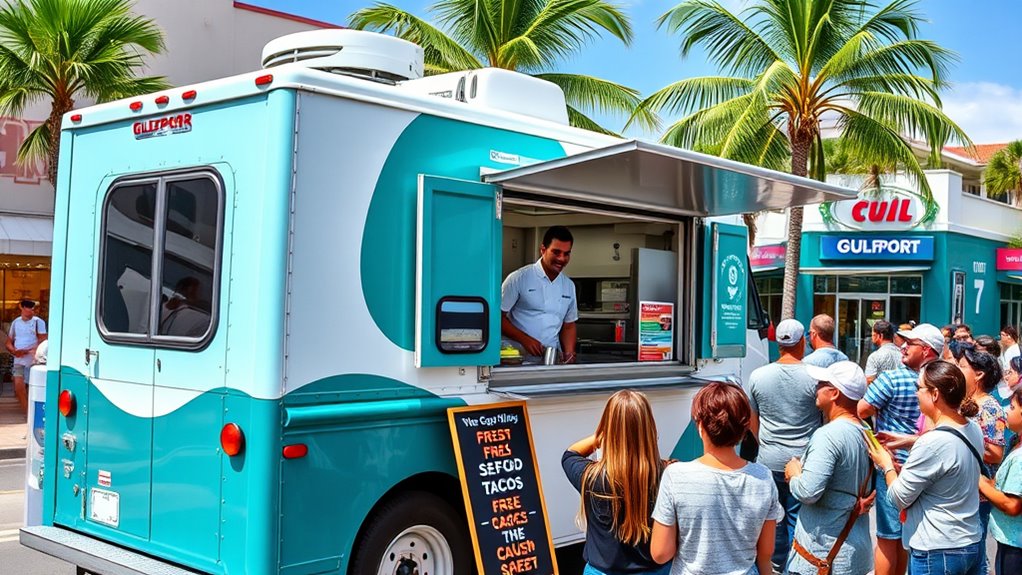
Choosing the right locations is essential for your food truck’s success in Gulfport. Focus on high-traffic areas like downtown, Gulfport Harbor Lights near beaches, and busy office parks for lunch crowds. Monthly events at Gulfport Premium Outlets and festivals such as Mama Ain’t Cooking offer excellent exposure. Parks, markets, shopping centers, and near schools or hospitals provide steady customer flow. Before setting up, confirm zoning laws and obtain all necessary permits, including health and parking permits. Consider utilities like water and electricity or plan for off-grid options. Evaluate safety factors, parking restrictions, and ease of access. Partner with event organizers or property owners for permission, and account for costs like permits, utilities, and potential fines. Proper location choice maximizes visibility and sales, boosting your food truck’s success. Additionally, leveraging mobile food culture by participating in local food truck events can greatly increase your visibility and customer base. Establishing a consistent mindfulness practice can also help you manage the stresses of operating in a busy environment, ensuring better decision-making and focus.
Designing a Menu That Meets Health Standards
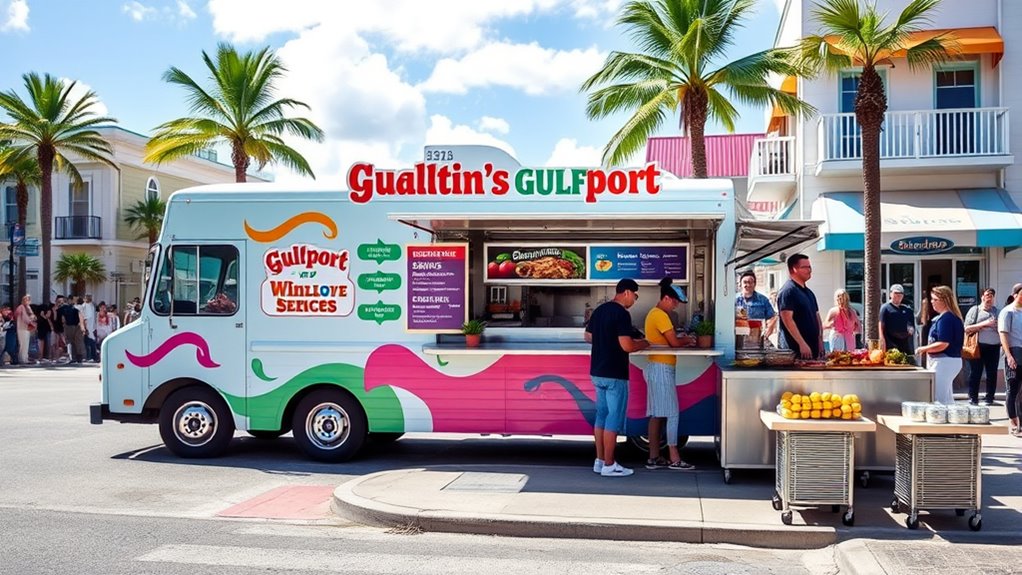
Designing a menu that meets health standards requires careful planning to guarantee food safety and compliance with state regulations. You need to select items that can be prepared and stored safely within your limited truck space, avoiding complex dishes that increase contamination risk. Focus on ingredients that can be kept at proper temperatures—cold below 41°F and hot above 135°F—and ensure raw and cooked foods are stored separately. Clearly label all ingredients, especially allergens like peanuts, dairy, gluten, and shellfish, and train staff to handle food safely. Use sanitized utensils and surfaces, implement strict handwashing protocols, and utilize approved sanitizers. Opt for food-grade packaging and minimize hand contact during serving. Additionally, understanding pinball machine weight is essential if you plan to incorporate vintage or themed decor elements into your truck design. This approach ensures your menu is safe, compliant, and prepared for consistent quality.
Effective Marketing Strategies to Attract Customers
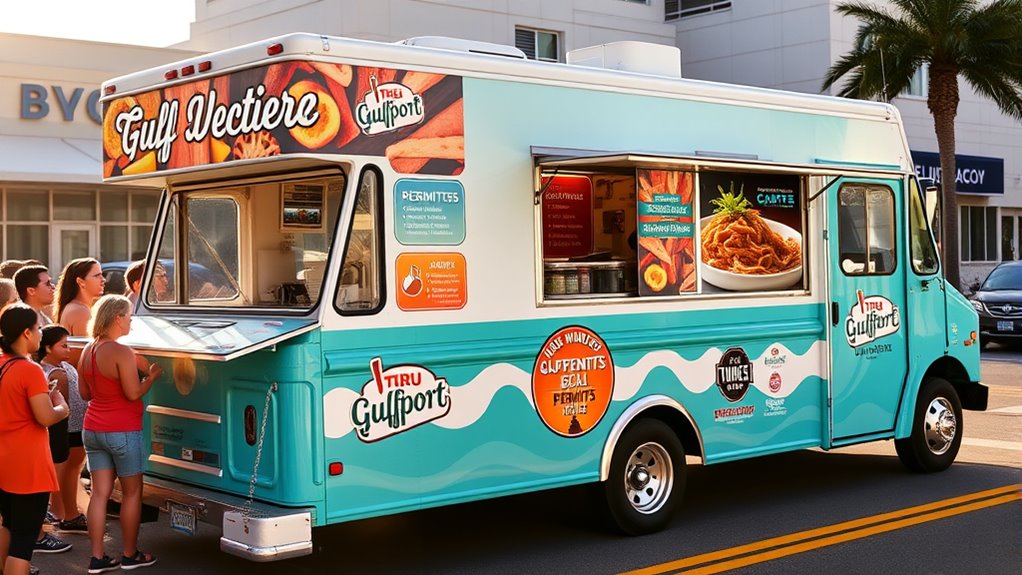
To effectively attract customers to your Gulfport food truck, leveraging a mix of social media marketing, local event participation, and customer engagement strategies is essential. Use social media platforms like Facebook, where 75% of food trucks actively promote their business, to showcase daily specials and behind-the-scenes content. Participating in local festivals and street fairs—over 80% of trucks do—boosts visibility and draws new customers. Implement loyalty programs and email marketing to turn first-timers into regulars, with over 50% of trucks seeing a 30% increase in repeat business. Tailor your branding and content to appeal to Millennials and Gen Z, emphasizing sustainability and local sourcing. Utilize data analytics and GPS apps to optimize your location and marketing efforts, increasing customer reach and sales. Digital tools like review platforms and analytics have been shown to improve customer satisfaction by 32%, further enhancing your reputation and repeat business. Additionally, understanding zodiac sign compatibility can help tailor your customer service approach to diverse clientele, fostering better relationships and repeat visits.
Ensuring Licensing and Ongoing Compliance
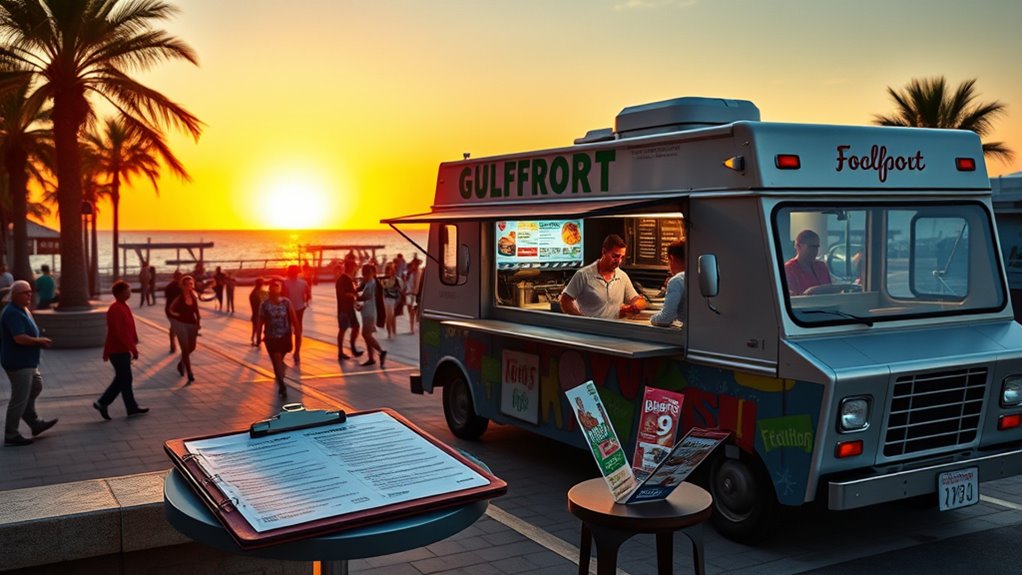
Ensuring your Gulfport food truck remains compliant with licensing requirements is essential for smooth operations and avoiding costly penalties. You must obtain a food vending permit from the Mississippi Department of Health and secure a business license through the Mississippi Department of Revenue. Keep detailed records, including proof of insurance, lease agreements, and site plans, and submit these along with your application to the city clerk’s office. Regular inspections by health authorities ensure ongoing food safety and sanitation standards are met. Operate only during approved hours and in designated locations, and stay current with tax filings, permits, and insurance. Any menu or equipment changes may require re-approval. Staying proactive with licensing and compliance safeguards your business and keeps you operating smoothly in Gulfport. Proper record-keeping and understanding hamster care costs can also help you budget for any unexpected expenses related to your food truck venture.
Frequently Asked Questions
How Long Does It Typically Take to Obtain All Necessary Permits in Gulfport?
You’re probably wondering how long it takes to get all your permits in Gulfport. Usually, the process takes about 20-25 working days once you submit a complete application. This includes city approval and plan review by the Mississippi Department of Health, which can add a few more weeks. To accelerate things, communicate early, guarantee your paperwork is thorough, and stay compliant with all requirements.
Are There Restrictions on the Types of Cuisine Allowed in Gulfport Food Trucks?
You might wonder if Gulfport limits your cuisine options. Luckily, there are no explicit restrictions on specific types of food trucks can serve. However, your menu must comply with health and safety regulations, and certain foods or preparation methods might be restricted to prevent health risks. Additionally, location and operational rules could influence what cuisine you choose, but overall, you’re free to offer a variety of foods as long as safety standards are met.
Can I Operate a Food Truck Without a Permanent Fixed Location?
Like a modern-day wandering minstrel, you can operate a food truck without a permanent location in Gulfport, MS. As long as your truck is mobile, follows time and place restrictions, and maintains proper permits, you’re good to go. You must select legal spots, avoid restricted areas, and guarantee compliance with health and safety codes. Quick cleanup and waste disposal are essential, making your mobile operation both legal and community-friendly.
What Are the Requirements for Parking and Moving the Truck Daily?
You need to guarantee your food truck moves off-site daily within 30 minutes of closing, complying with local laws. You must stay present during operation, avoid parking in restricted areas like fire hydrants or near restaurants, and use authorized off-street lots or zones with permits. Properly contain and dispose of waste, and adhere to signage and parking restrictions. Regular movement and compliance keep your operations legal and avoid towing or penalties.
How Often Are Health Inspections Conducted on Food Trucks in Gulfport?
You might wonder how often health inspections happen for Gulfport food trucks. Based on regulations, inspections are usually between once and four times a year, depending on your risk level. The Mississippi Department of Health oversees this process, focusing on sanitation and food safety. They can inspect at any time if there’s a complaint. Staying compliant with permits and health standards guarantees your truck passes inspections smoothly and keeps your business running.
Conclusion
Launching your Gulfport food truck is an exciting endeavor, blending bold branding with meticulous management. By mastering permits, monitoring costs, choosing prime locations, and crafting creative cuisine, you’ll create a compelling culinary cart. Remember, consistent compliance and clever marketing are keys to flourishing fame. With focus, flair, and a fierce focus on fundamentals, you’ll foster a flourishing food truck venture that fuels your passion and impresses appetites across Gulfport.
